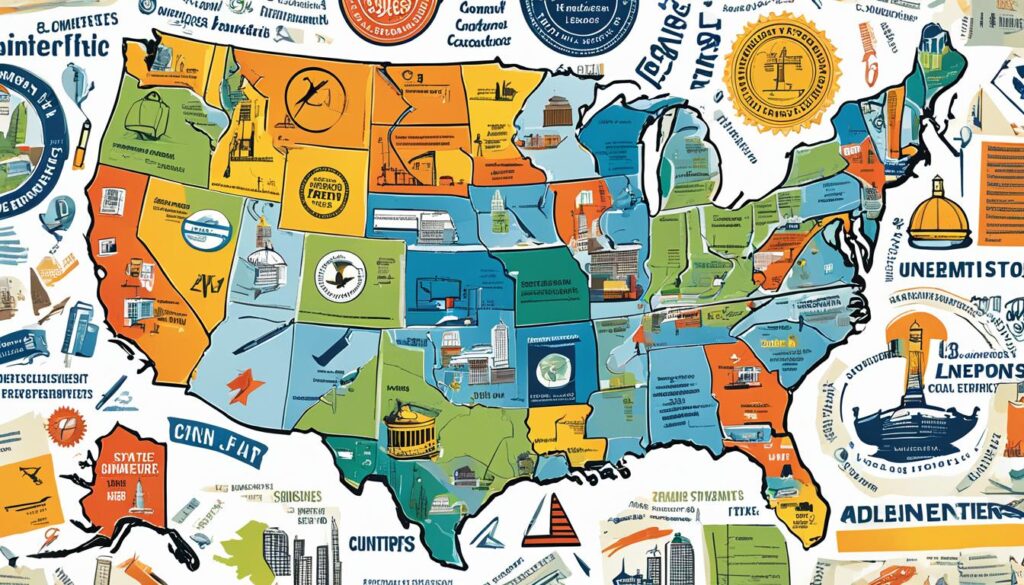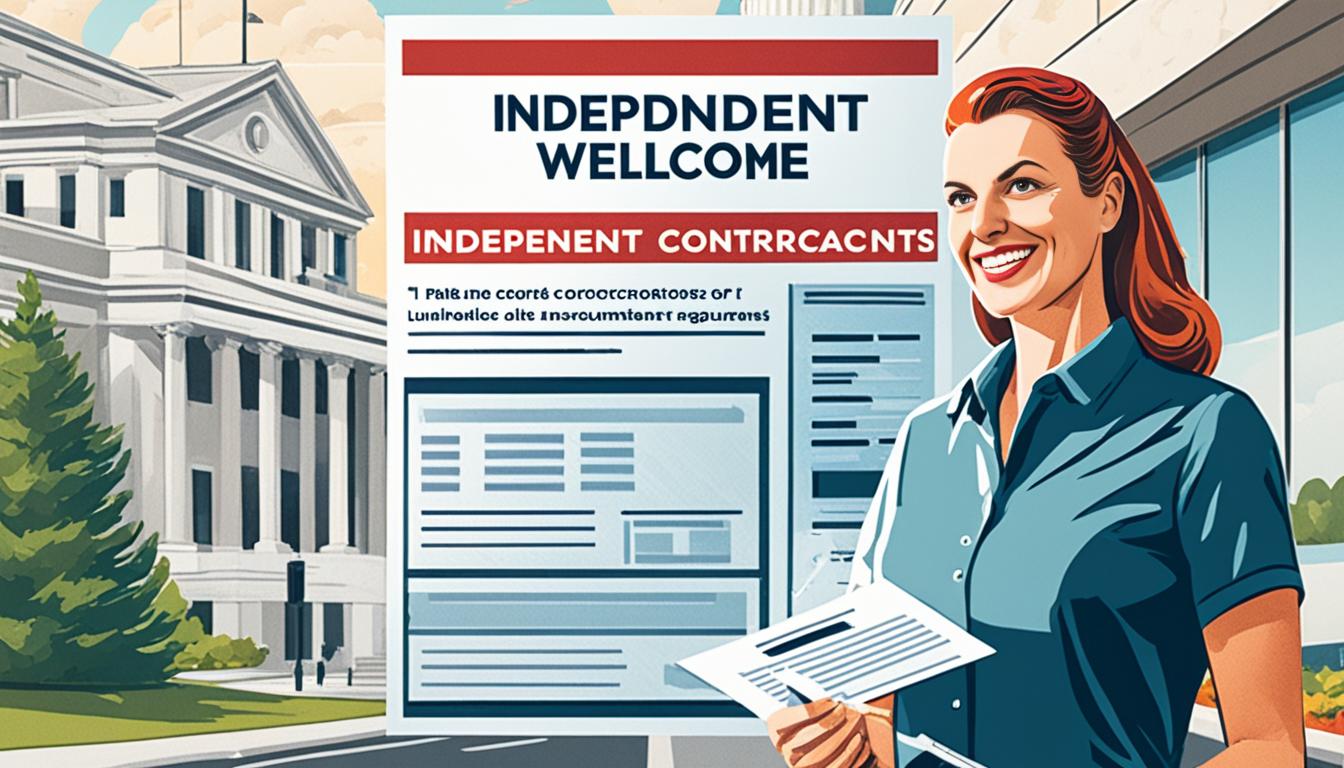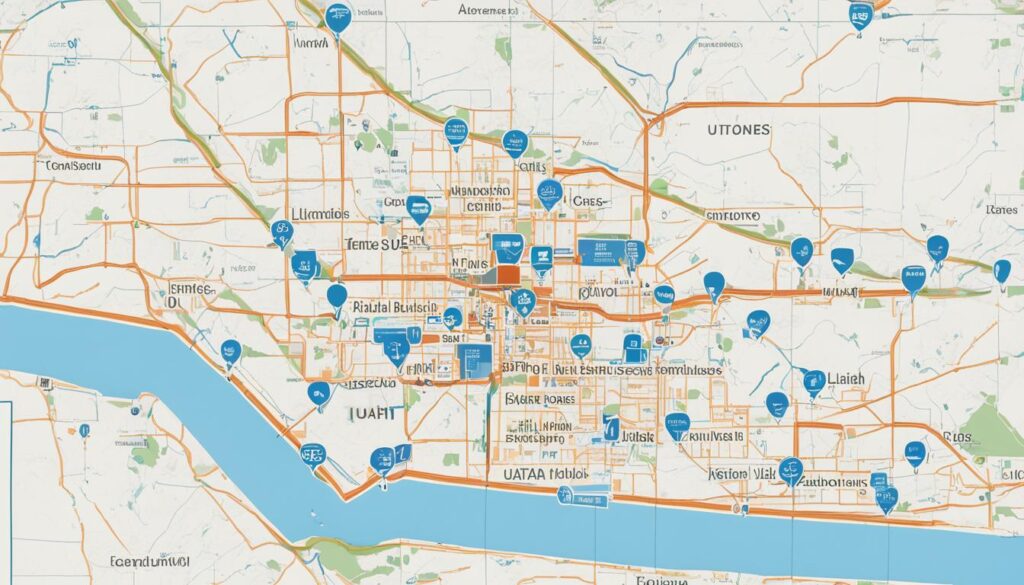Are you an independent contractor in the United States wondering about the requirements for your work? The gig economy is growing fast, with nearly 36% of Americans now working as independent contractors. This growth has raised questions about freelancer permit laws and rules.
Whether you need a business license depends on where you live and what you do. Most states don’t require licenses for independent contractors. But, some places like Alaska and Washington do. It’s important to talk to your local officials to know the rules in your area.
Your local Chamber of Commerce, city clerk, or planning and zoning department can help with license info. Knowing about these requirements helps keep your business legal. It also helps you avoid fines or penalties.
Key Takeaways
- 36% of the US workforce consists of independent contractors
- Business license requirements vary by state and locality
- Alaska and Washington require licenses for independent contractors
- Check with local authorities for specific licensing needs
- Compliance with freelancer permit laws is essential for legal operation
- Stay informed about self-employment regulations in your area
Understanding Independent Contractor Status
Working as an independent contractor means you’re in a special role in the business world. You have your own set of rules and duties. This includes handling things like sole proprietor licensing and contractor business registration.
What Is an Independent Contractor?
An independent contractor is someone who works for themselves. They might be called a freelancer or gig worker. They handle their own taxes and don’t get employee benefits.
Independent Contractors vs. Employees
Independent contractors have more control over their work than employees do. They pick their clients, set their hours, and decide how to finish projects. But, they also have to handle their own licensing and business matters.
Pros and Cons of Independent Contracting
Being an independent contractor means you can work on different projects and earn more. You can build a diverse portfolio. But, you also have to deal with business licensing, manage your taxes, and get your own benefits. It’s a choice between freedom and stability that many find rewarding.
Business License Requirements for Independent Contractors
Independent contractors have different business license needs across the U.S. As a 1099 worker, knowing the laws in your area is key. These laws change based on where you work and what you do.

Most states don’t need a special 1099 worker license. Alaska and Washington are the exceptions. In other places, you might need a general business license or tax certificate. If your work is in a field regulated by the federal government, you could need licenses from federal agencies.
Some jobs, like construction, always need special licenses, no matter where you are. It’s important to talk to local officials and professional groups to find out what you must do. Knowing these rules is crucial to stay legal and avoid problems.
To follow the rules for independent contractors, do these things:
- Look into your state’s specific rules
- Check local laws in your city or county
- See if your job needs special licensing
- Talk to a lawyer if you’re not sure
By keeping up with licensing laws, you can run your business legally and with confidence. Remember, laws can change, so always check your compliance often.
Do I Need a Business License as an Independent Contractor?
As an independent contractor, you might wonder if you need a business license. The answer depends on where you work and what you do. Let’s look at the main things that affect your licensing needs.
State-Specific Requirements
State rules for contractors vary a lot across the U.S. Some states don’t need a license for all contractors, while others do. For example, Virginia doesn’t require a general business license but has specific rules for certain jobs. It’s important to check your state’s rules to follow them.

Industry-Specific Licensing
Many jobs need special licenses. If you work in healthcare, law, construction, or other regulated areas, you’ll likely need certain certifications or permits. These licenses show you’re an expert and protect customers. Make sure to look into your industry’s rules to avoid legal problems.
Local Regulations and Permits
Don’t forget about local business permits. Cities and counties have their own rules. For example, Florida needs a local business license for all businesses selling goods or services. If you work from home, check the zoning laws. If you sell products, you might need a sales tax permit. Always look into local rules to follow them.
Remember, dealing with these rules can be tricky. It’s smart to talk to a local business advisor or lawyer to make sure you’re doing everything right as an independent contractor.
Steps to Obtain a Business License
Getting a business license is crucial for self-employed people. It might seem hard, but it’s easier with the right steps. Let’s go through the steps for independent contractors.
First, pick a unique name for your business and choose a structure. You could go for a sole proprietorship, LLC, or corporation. Each has its own benefits and drawbacks, so think it over before making a choice.
Then, register your business with state or local authorities. This step is key in the contractor registration process. You’ll need to share some details about your business and pay a fee.
Look into the licenses and permits you need. These might include:
- General business license
- Professional license
- Industry-specific certifications
Get a tax registration certificate from your local tax collector. This is vital for handling your business taxes right.
If you’re not sure about any part of the process, get help. Talk to a legal expert or your local Small Business Administration office. They can guide you on the steps needed in your area and make sure you follow all the rules.
Other Legal Considerations for Independent Contractors
As an independent contractor, you handle your own money and legal stuff. You must set aside money for self-employment taxes. Make sure to pay these taxes on time to the IRS. Keep good records of your earnings and spending to simplify taxes later.
Think about contractor insurance too. Clients often want to see your insurance before they hire you. This usually means having general and professional liability coverage. Insurance shields you from legal and financial risks.
Don’t overlook business expense deductions. As a self-employed person, you can deduct many work-related costs from your taxes. This includes things like home office expenses, buying equipment, and insurance premiums. These deductions can lower your taxes, so keep an eye on your business spending.
It’s a good idea to talk to a tax expert or lawyer about your situation. They can help you understand self-employment laws and make sure you’re doing everything right. Remember, keeping up with these things is key to doing well as an independent contractor.
FAQ
What is an independent contractor?
How do independent contractors differ from employees?
Do I need a business license as an independent contractor?
What are some common business license requirements for independent contractors?
How do I obtain a business license as an independent contractor?
What other legal considerations should independent contractors be aware of?
Author
-

David Nguyen is an expert in business licensing, with extensive knowledge in local and international regulations. His expertise is crucial for businesses seeking guidance on compliance and licensing strategies.
View all posts



